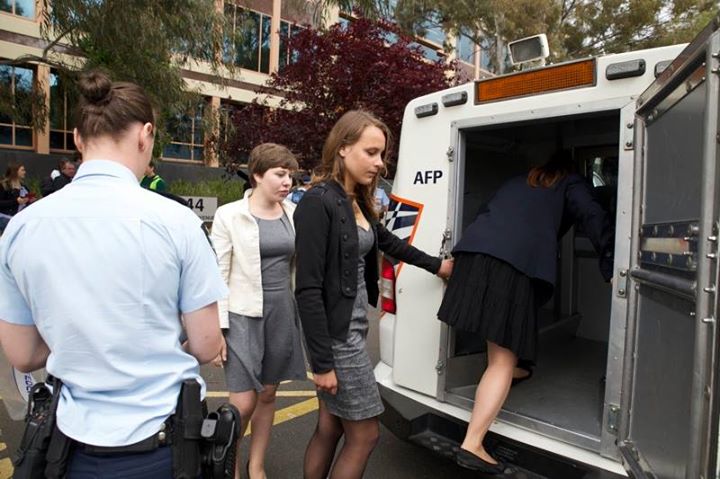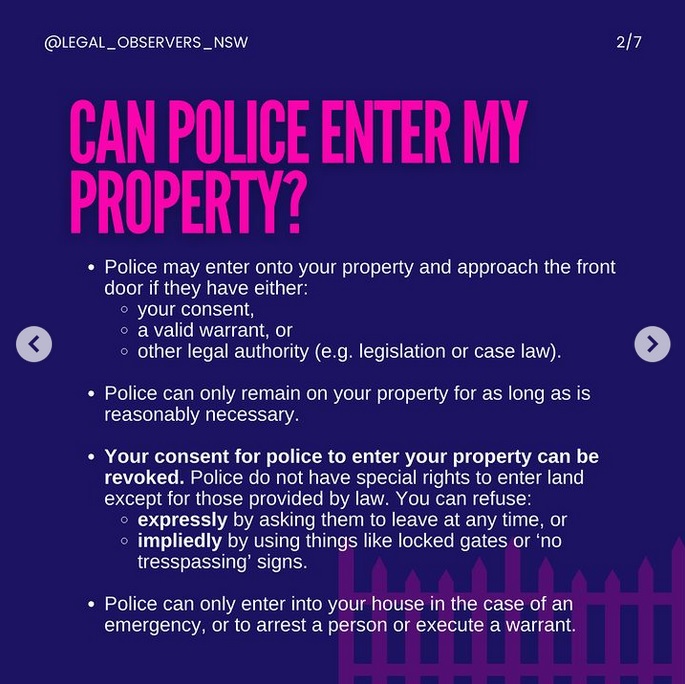In choosing to participate in peaceful protest actions you can often come face to face with police. Here are some tools to assist you with the legals. Firstly, with understanding your legal rights when participating in actions and protests. There are also some tips for dealing with police, as well as minimising the information they, or others can access.
It is important to KNOW YOUR RIGHTS but also understand that police may not always respect these. That’s why we ensure our legals resources are reflective of the reality on the ground.
If you are new to activism, it is really important that you understand that there are very different laws state to state, or within territories. Always make sure you are getting the correct information for your area.
As an experienced activist who may attend convergences or big actions interstate, please also be aware that there are differences in very basic rights and police powers and charges. For example, in different states you are required to give different information to identify yourself.
- Sometimes it’s just name and address, sometimes it includes date of birth. Often the police will also ask for a phone number which you are never required to give.
- There are also quite significant differences in what actions may constitute resisting arrest, and varying charges in different jurisdictions.
On this page: Your Legals Rights | Dealing with Police | Digital Privacy | Legal Observers | I need a Lawyer | Legal Aid | Court Process
YOUR LEGAL RIGHTS AND POLICE POWERS
DEALING WITH POLICE
- Our guide for the role of police liaison
- Facing police at protests – great overview from Activist Rights website
We want to acknowledge that there is a huge difference in how police treat different people. First Nations people can often experience much harsher treatment, as can queer and trans people. You should consider how you might be impacted by police in custody if you are considering a deliberate civil disobedience arrest or may be simply risking arrest and could be targeted. Talk with your group.
If you are hurt by police, it is very important to get information recorded while it was fresh. Both from yourself and others. Write it down, or record a voice note or video. Here is a guide for how to write a witness statement.
If you are assaulted or hurt, you can contact your local community legal centre. But be warned they can be very stretched.
- If you are in Melbourne try the Police Accountability project
- In Sydney the Redfern CLC is excellent
- For issues with police during environmental protest nationwide you can contact the Environmental Defenders Office on this secure form – this could include assault, overt surveillance, raids or other harassment
DIGITAL PRIVACY
It is important for activists to educate themselves on digital privacy and how police, other government agencies and corporations can monitor or disrupt the work of peaceful protest.
There have been numerous situations over the years where activist groups have become aware of surveillance, or had police or corporate spies infiltrate their groups. The best surveillance, however, will not be noticed by activists. This is why it is important that we implement some basic practices around digital privacy.
It’s also important to embrace “security culture“, which refers to a set of practices, or norms, that groups adopt to minimise risk.
LEGAL OBSERVERS
There are currently three legal observer teams on the east coast. We have trained folks for legal observer work, as well as general activist legal support across the country. Legal Observer (LOs) organisations are independent groups that monitor and document human rights, and police activity at protests and rallies. Each collective has a different scope to their work. This can include advocacy, turning out teams to observe events, supporting with specific events, or connecting activists to lawyers.
CounterAct has worked across the country over the last decade to build movement capacity for legal support and infrastructure within activist groups, as well as with LO groups. We’ve worked with many folks involved or provided provided foundational resources with these groups:
- NAARM/MELBOURNE – Melbourne Activist Legal Support
- GADIGAL/SYDNEY – NSW Legal Observers
- MEANJIN/BRISBANE – Action Ready
In recent years there has been excellent work done as these groups have built their capacity in providing timely updates on social media for issues impacting activists, whether in response to a spate of police home visits or incident reports about policing at various events.
I NEED A LAWYER
There are significant differences among states in the capacity of community legal centres, and private solicitors who provide pro bono (free) representation.
If you are involved in a peaceful protest for environment or climate change, the Environmental Defenders Office will often be able to support you as their criminal representation program expands.
They may also direct you to trusted lawyers in different states if they can not assist, or if you are arrested in relation to a social or racial justice issue.
While there is no current national register for pro bono lawyers for activists, your best bet is to:
- check with local activist groups who they use,
- try the Environmental Defenders Office, or
- ask progressive community legal centres.
We are hopeful this will be set up in future; we are passing lawyer contacts to EDO.
LEGAL AID
Legal Aid are often not useful for activists and are often unfamiliar dealing with protest related charges, and the different approaches activists may take to other people they support.
They have a restrictive criteria for accepting clients, including detailed reporting of your financial circumstances. Also, the charge must involve a risk of jail time. Sadly however, jail risk for activists has become more common, and so one area they can be very helpful in is in challenging bail conditions, if you can’t access other lawyers.
You can find your local legal aid in this list as well as other pro bono resources.
COURT PROCESS
Here is our guide to Considerations for the Court process. We will be adding more to this section in 2024.
There has been a recent trend towards activists advocating for people to self represent in court. This can be an empowering experience if the stakes are not high, and you understand the situation well and have done plenty of research. However, if you are arrested as part of a mass action and choose this path, or have an adverse finding in a complex situation, its useful to be aware this may have ramifications for other activists
We also have more resources to come here in mid 2024 - including an Activist Lawyer translation guide, resources for self representation and more.
“Grassroots, good legal info, good understanding of how to build momentum.”


